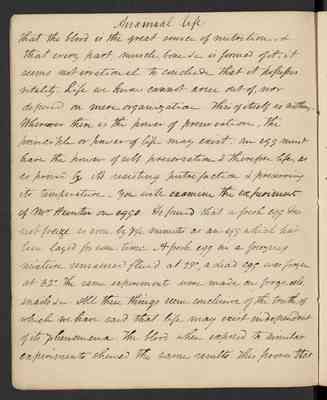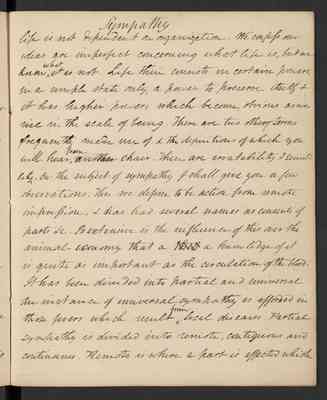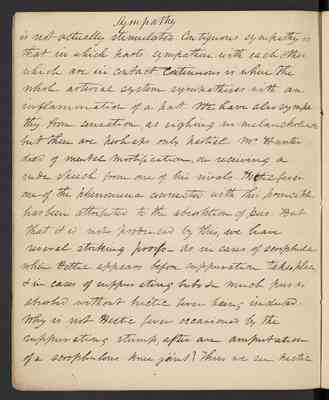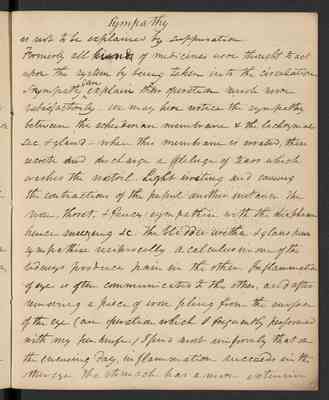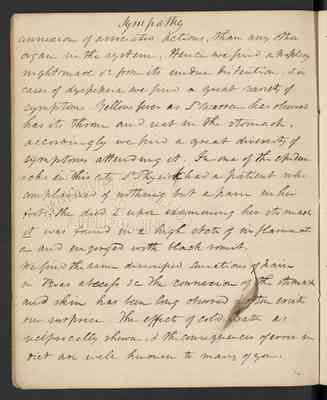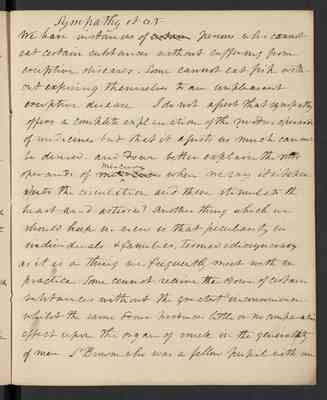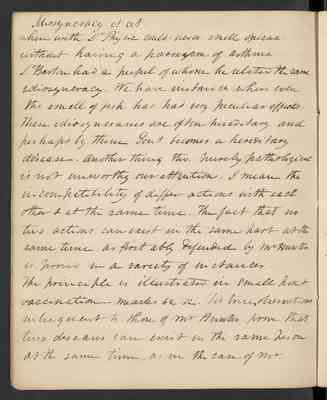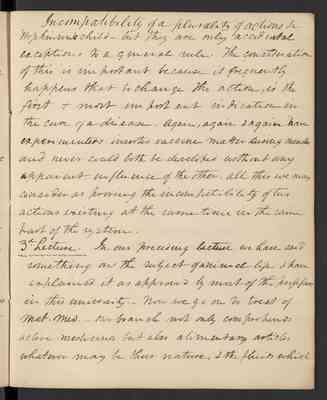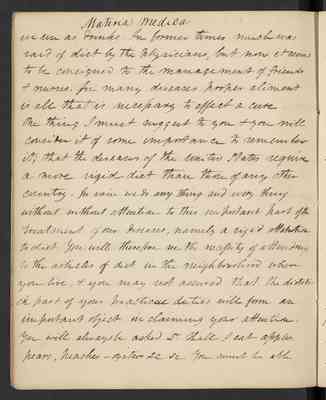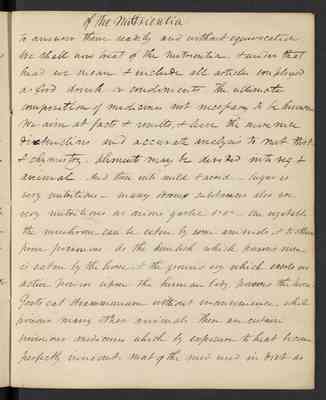Pages That Need Review
College of Physicians of Philadelphia: Robert Pryor Richardson notes on the lectures of John Syng Dorsey, 1817 (10a-198)
6
Anaimal Life
that the blood is the great source of nutrition, & that every part, muscle, bone c is formed of it, it seems not irrational to conclude that it possesses vitality. Life we know cannot arise out of, nor depend on mere organization. This of itself is nothing. Wherever there is the power of preservation, the principle or power of life may exist. An egg must have the power of self preservation and therefore life, as is proved by its resisting putrefaction and preserving its temperature. You will examine the experiments of Mr. Hunter on eggs. He found that a fresh egg does not freeze so soon by 7½ minutes as an egg which had been layed for some time. A fresh egg in a freezing mixture remained fluid at 29°, a dead egg was frozen at 32°. The same experiments were made on frogs, eels, snails, c. All these things seem conclusive of the truth of which we have said that life may exist independent of its phenomena. The blood when exposed to similar experiments showed the same results. This proves that
7
Sympathy
life is not dependent on organization. We confess our ideas are imperfect concerning what life is, but we know what it is not. Life then consists in certain powers, in a simple state only, a power to preserve itself & it has higher powers, which became obvious as we rise in the scale of being. There are two other terms frequently made use of & the definitions of which you will hear from another chair. These are irratability & sensibility On the subject of sympathy I shall give you a few observations. This we define to be action from remote impression, and has had several names as consents of parts c. So extensive is the influence of this over the animal economy that a a knowledge of it is quite as important as the circulation of the blood. It has been divided into partial and universal. An instance of universal sympathy is afforded in these fevers which result from local diseases. Partial sympathy is divided into remote, contiguous and continuous. Remote is where a part is affected which
8
Sympathy
is not actually stimulated. Contiguous sympathy is that in which parts sympathise with each other which are in contact. Continuous is where the whole arterial system sympathises with an inflammation of a part. We have also sympathy from sensation, as sighing in melancholia c but these are perhaps only partial. Mr. Hunter died of mental mortification, on receiving a rude speech from one of his rivals. Hectic fever one of the phenomena connected with this principle, has been attributed to the absorption of pus. But that it is not produced by this, we have several striking proofs—As in cases of scrophula, when Hectic appears before suppuration takes place, & in cases of suppurating bubo &c much pus is absorbed without hectic fever being induced. Why is not Hectic fever occasioned by the suppurating stump, after an amputation of a scrophulous knee joint? Thus we see hectic
9
Sympathy
is not to be explained by suppuration. Formerly all kinds of medicines were thought to act upon the system by being taken into the circulation. Sympathy can explain this operation much more satisfactorily. We may here notice the sympathy between the schneiderian membrane and the lachrymal sac & gland—when this membrane is [irrated], these secrete and discharge a deluge of tears which washes the nostril. Light irrated and causing the contraction of the pupil another instance. The nose, throat, and fauces sympathise with the diaphram hence sneezing c. The bladder urethra & glans penis sympathise reciprocally. A calculus in one of the kidneys produces pain in the other. Inflammation of eye is often communicated to the other, and after removing a piece of iron filing from the surface of the eye (an operation which I frequently performed with my pen knife) I find most uniformly that on the ensueing day, inflammation succeeds in the other eye. The stomach has a more extensive
10
Sympathy
connexion of associated actions, than any other organ in the system; Hence we find a apoplexy nightmare c from its undue distention, & in cases of dyspepsia we find a great variety of symptoms. Yellow fever as Dr. Warren has observed has its throne and seat in the stomach, accordingly we find a great diversity of symptoms attending it. In one of the epidemdicks [sic] in this city Dr. Physick had a patient who complained of nothing but a pain in her foot. She died & upon examining her stomach it was found in a high state of inflammation and engorged with black vomit.
We find the same diversified sensations of pain in Psoas abcess c. The connexion of the stomach and skin has been long observed & often excites our surprise. The effects of cold water as reciprocally shown, & the consequences of error in diet are well known to many of you.
11
Sympathy et cet
We have instances of certain persons who cannot eat certain substances without suffering from eruptive diseases. Some cannot eat fish without exposing themselves to an unpleasant eruptive disease. I do not assert that sympathy offers a complete explanation of the modus operandi of medicines but that it assists as much cannot be denied. And do we better explain the mod operandi of medicines mercury when we say it is taken into the circulation and there stimulates the heart and arteries? Another thing which we should keep in view is that peculiarity in individuals & families, termed idiosyncracy as it is a thing we frequently meet with in practice. Some cannot receive the odour of certain substances without the greatest inconvenience whilst the same odour produces little or no comparative effect upon the organ of smell in the generality of men. Dr. Brown who was a fellow pupil with me
12
Idiosyncracy et cet
when with Dr. Physic could never smell ipecac without having a paroxysm of asthma. Dr. Barton had a pupil of whom he related the same idiosyncracy. We have instances where even the smell of fish has had very peculiar effects. These idiosyncrasies are often hereditary and perhaps by these Gout becomes a hereditary disease. Another thing tho. purely pathological is not unworthy our attention. I mean the incompatibility of different actions with each other & at the same time. The fact that no two actions can exist in the same part at the same time as first ably defended by Mr. Hunter, is proven in a variety of instances. The principle is illustrated in small pox & vaccination—measles c c. Tis true, observations subsequent to those of Mr. Hunter prove that two diseases can exist in the same person at the same time, as in the case of Mr.
13
Incompatibility of a plurality of actions c.
Hopkinson's child—but they are only accidental exceptions, to a general rule. The consideration of this is important because it frequently happens that to change the action, is the first & most important indication in the cure of a disease. Again, again, & again have experimenters inserted vaccine matter during measles and never could both be developed without any apparent influence of the other. All this we may consider as proving the incompatibility of two actions existing at the same time in the same part of the system.
3d Lecture In our preceding lecture we have said something on the subject of animal life. I have explained it as approved by most of the professors in the university—Now we go on to treat of Mat. Med.—our branch not only comrephends active medicines but also alimentary articles whatever may be their nature, & the fluids which
14
Materia Medica
we use as drinks. In former times much was said of diet by the physicians, but now it seems to be consigned to the management of friends & nurses. In many diseases proper aliment is all that is necessary to effect a cure. One thing I must suggest to you & you will consider it of some importance to remember it; that the diseases of the United States require a more rigid diet than those of any other country. In vain we do any thing and every thing without without [sic] attention to this imporant part of the treatment of our diseases, namely a rigid attention to diet. You will therefore see the necessity of attending to the articles of diet in the neighborhood where you live, & you may rest assured that the dietetick part of your practical duties will form an important object in claiming your attention. You will always be asked Dr. Shall I eat apples, pears, peaches, oysters c c. You must be able
15
of the Nutrientia
to answer them readily and without equivocation. We shall now treat of the nutrientia, & under that head we mean & include all articles employed as food, drink or condiments. The ultimate composition of medicines not necessary to be known. We aim at facts & results & leave the more nice distinctions and accurate analysis to nat. hist. & chymistry. Aliments may be divided into veg. & animal. And these into mild and acrid—Sugar is very nutritious—many odorous substances also are very nutritious as onions garlic c c—One vegetable the mushroom can be eaten by some animals, and to others prove poisonous. As the hemlock which poisons men, is eaten by the horse, and the ground ivy which exerts no active powers upon the human body, poisons the horse. Goats eat strammonium without inconvenience while poisons many other animals. There are certain poisonous medicines which by exposure to heat become perfectly innocent. Most of the med. used in diet as
